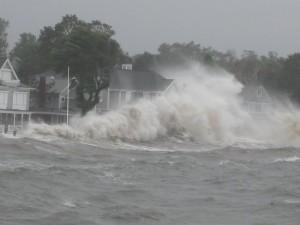 It’s not a happy feeling. It doesn’t feel sociable. It’s not the sort of thing you like to talk about. I knew, when I was standing on the wet rocks and leaning into the wind so that I could see the waves smash over the seawall, that things people cared about were getting broken. We didn’t have any injuries in Short Beach, at least not any major ones, but we lost several trees, porches, and docks. I won’t even try to put a number on property damage.
It’s not a happy feeling. It doesn’t feel sociable. It’s not the sort of thing you like to talk about. I knew, when I was standing on the wet rocks and leaning into the wind so that I could see the waves smash over the seawall, that things people cared about were getting broken. We didn’t have any injuries in Short Beach, at least not any major ones, but we lost several trees, porches, and docks. I won’t even try to put a number on property damage.
I was watching with my neighbor, a contractor and home-builder, and he said what I was thinking: “Isn’t it beautiful?”
The standard intellectual move when faced with the terrible beauty of storms plunges into the long history of the aesthetic sublime, from Longinus to Burke to Kant. But boundlessness and horror and hurrying the mind out of itself don’t quite match what was happening during the storm. It wasn’t that the wind and rain and surf were boundless or inconceivable — though I suppose they were, at least to the extent that it was impossible to grasp the experience whole — but instead that the once-stable granite vistas of the Connecticut shoreline became all of a sudden a swirling mass, a moving, living, body inside which my own body was one vibrating part. A vision of immensity and power — that much the sublime theorists got right — but even more a vision of immersion, embeddedness, embodiment in a visceral and uncomfortable sense.
The storm strikes us “To the skin,” says old King Lear as he wanders in the night. In Strange Weather in King Lear I explored those scenes as performing the boundary between body and environment in a particularly brutal way that might speak to an ecology of crisis. As Irene soaked me to the skin, I wondered if I’d missed the ecstasy of storm in my emphasis on human weakness. Michel Serres talks about living in “shipwreck alert,” ready for radical contingency and disorder. There’s a pleasure — perhaps an inhuman one? — in that.
I’ve also been thinking about John Donne’s “The Storm,” which I spend some time with in my shipwreck book-in-progress. Donne’s letter starts with a crisis of identity: “Thou which art I,” he writes to his friend, while also noting that the friend is “still thy selfe.” The friends losing themselves in each other is a humanist trope, but I wonder if in this poem it anticipates the fraying of identity during the storm at sea —
But when I wakt, I saw, that I saw not.
I, and the Sunne, which should teach mee, had forgot
East, West, day, night, and I could onely say,
If the world had lasted, now it had been day.
“All things are one,” the poet says a little farther on, and he portrays the elemental choas as fracturing his sense of self. But it’s not, I don’t think, the detached pleasure and intellectual phase-shifting of the 18c sublime; instead, it’s a deeply physical, even if intellectually abstracted, sense of being inside a disorderly and disordering world. Having no way to get out of it or keep it from striking you. And sucking in the strange beauty of it.
Conrad, as usual, knows just what to say about this sort of thing —
If you would know the age of the earth, look upon the sea in storm. (The Mirror of the Sea)
[…] not a night for storms or strains or hard thinking. Just immersion by silvery light. I took a short swim out to the […]